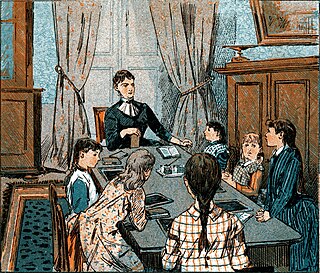
Homeschooling or home schooling, also known as home education or elective home education (EHE), is the education of school-aged children at home or a variety of places other than a school. Usually conducted by a parent, tutor, or an online teacher, many homeschool families use less formal, more personalized and individualized methods of learning that are not always found in schools. The actual practice of homeschooling can look very different. The spectrum ranges from highly structured forms based on traditional school lessons to more open, free forms such as unschooling, which is a lesson- and curriculum-free implementation of homeschooling. Some families who initially attended a school go through a deschool phase to break away from school habits and prepare for homeschooling. While "homeschooling" is the term commonly used in North America, "home education" is primarily used in Europe and many Commonwealth countries. Homeschooling should not be confused with distance education, which generally refers to the arrangement where the student is educated by and conforms to the requirements of an online school, rather than being educated independently and unrestrictedly by their parents or by themselves.
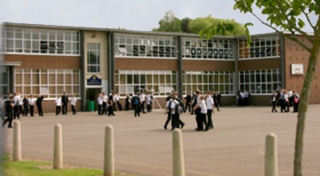
A school is an educational institution designed to provide learning spaces and learning environments for the teaching of students under the direction of teachers. Most countries have systems of formal education, which is sometimes compulsory. In these systems, students progress through a series of schools. The names for these schools vary by country but generally include primary school for young children and secondary school for teenagers who have completed primary education. An institution where higher education is taught, is commonly called a university college or university.

The Montessori method of education is a system of education for children that seeks to develop natural interests and activities rather than use formal teaching methods. A Montessori classroom places an emphasis on hands-on learning and developing real-world skills. It emphasizes independence and it views children as naturally eager for knowledge and capable of initiating learning in a sufficiently supportive and well-prepared learning environment. The underlying philosophy can be viewed as stemming from Unfoldment Theory. It discourages some conventional measures of achievement, such as grades and tests.
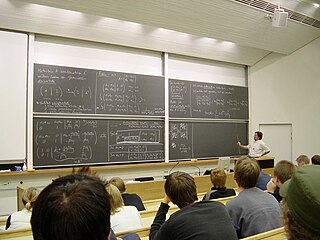
In contemporary education, mathematics education is the practice of teaching and learning mathematics, along with the associated scholarly research.
Education in the United Kingdom is a devolved matter with each of the countries of the United Kingdom having separate systems under separate governments: the UK Government is responsible for England; whilst the Scottish Government, the Welsh Government and the Northern Ireland Executive are responsible for Scotland, Wales and Northern Ireland, respectively.
Special education is the practice of educating students in a way that accommodates their individual differences, disabilities, and special needs. This involves the individually planned and systematically monitored arrangement of teaching procedures, adapted equipment and materials, and accessible settings. These interventions are designed to help individuals with special needs achieve a higher level of personal self-sufficiency and success in school and in their community, which may not be available if the student were only given access to a typical classroom education.
Educational technology is the combined use of computer hardware, software, and educational theory and practice to facilitate learning. When referred to with its abbreviation, edtech, it is often referring to the industry of companies that create educational technology.
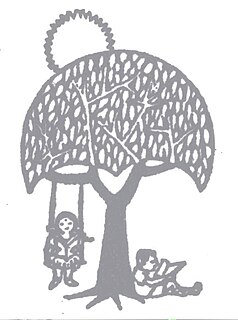
Vikasa Vidya Vanam is a school located in Poranki, a suburb of Vijayawada, New Delhi, India. It was established in 1983 in Vijayawada with the principle of child-centered education by a group of academic intellectuals forming Vikasa educational trust. It later moved to the current location in Poranki, and attained ICSE-Board affiliation in 2000. The school has student strength around 375, predominantly coming from the region of Vijayawada and its suburbs.

Democratic education is a type of formal education that is organized democratically, so that students can manage their own learning and participate in the governance of their school. Democratic education is often specifically emancipatory, with the students' voices being equal to the teacher's.

Mainstreaming, in the context of education, is the practice of placing students with special education needs in a general education classroom during specific time periods based on their skills. To clarify, this means students who are a part of the special education classroom will join the regular education classroom at certain times which are fitting for the special education student. These students may attend art or physical education in the regular education classrooms. Sometimes these students will attend math and science in a separate classroom, but attend English in a general education classroom. Schools that practice mainstreaming believe that students with special needs who cannot function in a general education classroom to a certain extent belong in the special education environment.

The educational system in Nepal was long based on home-schooling and gurukulas. This was similar to the former Indian system of education, in which the pupils would learn either in their homes or with reputed priests or Gurus. Before Nepal was declared a democratic country, the general public had no access to formal education. The first formal school, Durbar High School, established by Jung Bahadur Rana in 1853, was intended for the elite. The birth of Nepalese democracy in 1951 opened its classrooms to a more diverse population. Education in Nepal from the primary school to the university level has been modeled from the very inception on the Indian system, which is in turn the legacy of the old British Raj.

The Dhirubhai Ambani International School (DAIS) is a private co-educational LKG-15 dayschool in Mumbai, Maharashtra, India, built by Reliance Industries, named after the late patriarch of the conglomerate, Dhirubhai Ambani. The school was established in 2003 and has been an IB World School since January 2003. It offers the International Baccalaureate Program in its Diploma form. Nita Ambani, wife of Mukesh Ambani is the chairperson of the school.

Thodur Madabusi Krishna is an Indian Carnatic vocalist, writer, activist, author and Ramon Magsaysay awardee. As a vocalist, he has made a large number of innovations in both the style and substance of his concerts, thereby inviting controversy from some quarters.
Lego Education is a Lego theme designed specifically for schools that concentrates sets that can be used by education institutions and includes sets the focus on Duplo and Technic themes and contain larger amounts of pieces. The theme was first introduced in 1999.
Yecha Gunja Rajalakshmi Parthasarathy, better known as Mrs YGP, was an Indian journalist, educationist and social worker. She was the founder and dean of the Padma Seshadri Bala Bhavan. Rajalakshmi was awarded the Padma Shri in 2010, India's fourth highest civil honour for her contribution to literature and education.

Manish Sisodia is an Indian politician and Deputy Chief Minister of Government of Delhi. He has been the Deputy Chief Minister of Delhi since February 2015. He is also an elected MLA from Patparganj constituency. In Government of NCT of Delhi, he holds the portfolios of Education, Higher Education, Technical Education, Public Works Department, Labour, Finance, Planning, Excise, GST, Vigilance, Services, Tourism, Land & Building, Art, Culture & Language.

Vidyaranya High School for Boys and Girls is a high school in Hyderabad, Telangana, India.
Google Classroom is a free blended learning platform developed by Google for educational institutions that aims to simplify creating, distributing, and grading assignments. The primary purpose of Google Classroom is to streamline the process of sharing files between teachers and students. As of 2021, approximately 150 million users use Google Classroom.
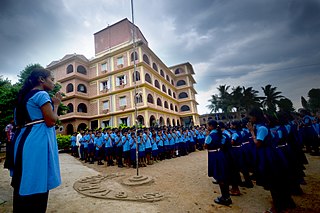
Gram Vikas Residential School is a co-educational Odia medium school that offers education from Grade 3 to Grade 10 level in Odisha, India. The school was founded in 1982 by Dr. Joe Madiath. It is affiliated to the Board of Secondary Education, Odisha. It has four branches. Gram Vikas High School was established in 1982 at Kankia village in the Ganjam district. Mahendra Tanaya Ashram School was established in Koinpur village in Gajapati District of Odisha in 1992. Two more schools, Gram Vikas Shiksa Niketan and Gram Vikas Vidya Vihar, were established in 1998 and 2002 in Kalahandi district and Ganjam district, respectively.
Podar International School is a group of schools that is a part of the Podar Education Network that was established in 1927 by Sheth Anandilal Podar, with Mahatma Gandhi as the first President of the trust. The group is headquartered in Mumbai. It offers educational streams such as the Central Board of Secondary Education (CBSE), Council for the Indian School Certificate Examinations (CISCE), Secondary School Certificate (SSC), Cambridge (IGCSE) and International Baccalaureate (IB).













